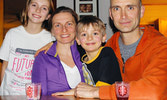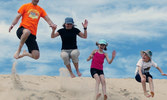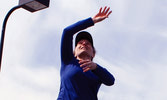Paralyzed yet determined, Julie Sawchuk begins her recovery
BY SHAWN LOUGHLIN
The life of 41-year-old Julie Sawchuk will now go one of two ways – which way, however, is dependent on whether or not she is able to walk again.
Sawchuk is the Blyth-area cyclist that was struck by a car while training late last month. The collision with a westbound Volkswagen Jetta has, for the time being, left her paralyzed from the chest down, but below her shoulders, meaning she has use of her arms.
“I’ve done nothing but think my whole time here,” Sawchuk said through tears in an interview with The Citizen from her London hospital room. “I can’t sleep. I can’t turn off my head. My body is completely broken, but my mind is absolutely perfect.”
Sawchuk is emotional in response to a question about the future, whether it be how she returns to her career as a high school teacher, how she re-ignites her passion for physical activity and the outdoors or how she continues her life as a wife to her husband Theo and mother to their children Ella and Oliver.
“I think about future stuff. I think about life with my kids,” she said.
Police say that Sawchuk was struck by a westbound Volkswagen Jetta on County Road 25 near Council Line before 9 a.m. on July 29. She was training for the Goderich Triathlon.
A 47-year-old Ashfield-Colborne-Wawanosh man has been charged with failing to turn out to left to avoid a collision with a bicycle in connection with the incident.
As a result of the collision, Sawchuk’s T4 vertebrae was fractured, Theo says, a fragment of which pierced the dura, the membrane around the spinal cord. Her T2 and T5 vertebrae were then fused together over eight hours of emergency surgery upon her arrival to Victoria Hospital in London.
In addition, Sawchuk suffered from a burst fracture in her L1 vertebrae, lacerations on her head and chin, a broken nose, five broken ribs, a fractured skull and various road rash injuries.
She says she doesn’t remember being hit and that she doesn’t even remember hearing the car. While her memory from that morning is hazy, Sawchuk says she does recall fragments of the experience, such as being airlifted to the hospital and how frightened she was.
She was first brought to hospital in Goderich, where she was stabilized, before being airlifted to London. Julie’s husband Theo, remembers seeing Julie during that brief period in Goderich. He said it was reassuring to see her, to look into her eyes and see his wife looking back at him, knowing that while her body may be injured, she was still well mentally.
The first thing Julie said to her husband, scrawled in a notebook, was “I’m sorry”.
From there, the dialogue continued, eventually moving from the notebook to a whiteboard, with Julie asking if she will walk again, about their children and, in a rare lighter moment, if Theo thought she could get a refund for her registration in the triathlon.
For the first five days of her time in the Critical Care Trauma Centre, Sawchuk was only allowed two visitors at a time, and felt it best to keep her children, Ella and Oliver, away from the centre for the time being, despite the difficulty she had with not seeing them for nearly a week. She said it is a “scary place” with almost constant activity. During this time she only saw Theo, her parents and a handful of immediate family members.
Julie says she is healing well, but still in a lot of pain. She is in a body brace and a collar, adding that taking a deep breath is often challenging.
Her next step is being told by doctors that she is well enough to be moved to the Parkwood Spinal Cord Institute, where Julie says she will learn how to live as a paraplegic.
While she appreciates the enthusiasm of doctors and of those around her, Julie, as a biology teacher, has asked people to be honest with her about the reality of her situation, while still hoping to regain feeling in her legs.
“I’m a very determined person and I’m going to get as much out of [rehabilitation] as I possibly can,” she said.
Theo says that since the collision he has seen his wife go through the highs and lows that can be expected after such a life-changing incident.
“I do see that determination in her, but you can also see that sadness and regret at times too,” he said. “But we have a feeling that we know we can get through it and I think that’s the currency that’s going to pay our way.”
Both Theo and Julie say they have been overwhelmed by the support they’ve received from the community, both local and from the cyclist community. Whether it’s people donating services or time, or stepping up and offering their help in whatever way they can, the Sawchuks have been so grateful for the support.
There is also a fundraising component to forjulie.com, a blog about Julie being maintained by a friend, aimed at helping the family through the process. With a stated goal of $10,000, as of Monday, fundraising for the Sawchuks had already topped $13,000.
As far as the future is concerned, Theo says there are all kinds of questions that will need to be answered going forward, but he says that change has happened and it can’t be ignored.
“Things have changed... irrevocably,” Theo said. “But we’re not afraid of it. We don’t have a choice but to go forward.”
While large questions about what her future life will look like still loom, Julie says that one thing is clear: once she is able, she will dedicate her life to spreading the message about sharing the road.
Two days before the collision, Julie contacted The Citizen in hopes of submitting a Letter to the Editor (click here to read that letter). About what, she didn’t say at the time, but the letter has since been published on forjulie.com, where Julie hopes to blog about her recovery progress as early as this week. The letter was about sharing the road with cyclists, detailing the many close calls she has had with passing vehicles.
When asked why she wanted the letter printed, Julie says because she was angry and she’s still angry.
Julie says she’s angry that some drivers can be so inconsiderate of cyclists on the road, all to trim their drive-time by a matter of seconds.
“Cyclists don’t even register as people sometimes,” she said. “The whole idea of sharing the road – there’s so much to it.”
Julie says that sharing the road is an entire state of mind that needs to be instilled in the world. It’s not just about cyclists, or motorists, but about mutual respect.
“It’s not about bright clothes or paved shoulders, it has to be this huge change,” she said.
She says that the Share the Road movement is gaining momentum, but she’s upset how it had to happen.
“Support for the movement is so essential. I’m pretty mad that it’s me, but I wouldn’t want this to happen to anyone else,” she said.
Unsure if she’ll ever be able to cycle on the road again herself, her goal is now to make it as safe a place for others as possible.
“As soon as I’m able, that’s my plan. I’m going to speak at schools and I want to make a simulator that shows what it’s like to be passed on a bike by an 18-wheeler going 100 kilometres per hour,” she said. “I want to create super bright cycling jerseys and shorts that say ‘share the road’. I have a lot of ideas – I feel like it’s my mission in life to work on this.”




